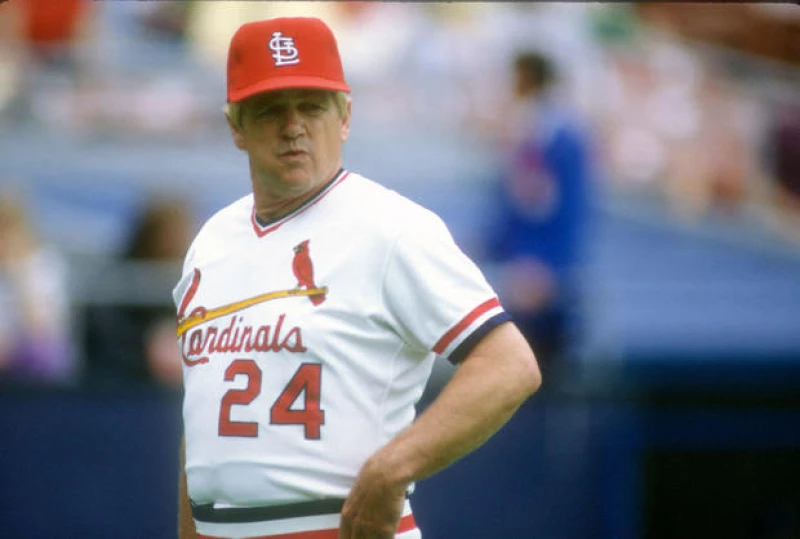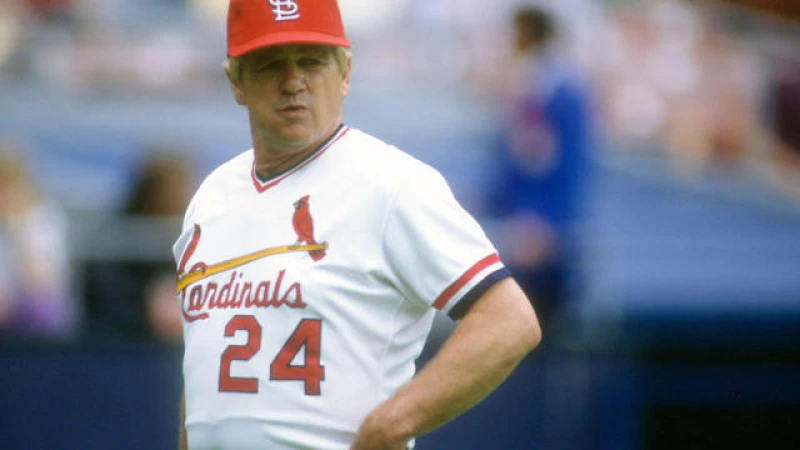Legendary Hall of Fame manager Whitey Herzog, known for his gruff demeanor and innovative "Whiteyball" strategy, has passed away at the age of 92. Herzog led the St. Louis Cardinals to three pennants and a World Series title in the 1980s, leaving a lasting impact on the game of baseball.
The Cardinals confirmed his death, with spokesman Brian Bartow stating that the team had been notified by Herzog's family. Details surrounding his passing were not immediately available, but Herzog had been present at Busch Stadium on April 4 for the team's home opener.
Reflecting on Herzog's legacy, Jane Forbes Clark, chair of the Hall of Fame's board of directors, praised his dedication to the sport and his ability to inspire players both on and off the field. She described Herzog as a true leader who commanded respect throughout the baseball community.

The Legacy of Whitey Herzog in Baseball
A crew-cut, pot-bellied tobacco chewer who had no patience for the "buddy-buddy" school of management, Herzog joined the Cardinals in 1980 and helped end the team's decade-plus pennant drought by adapting it to the artificial surface and distant fences of Busch Memorial Stadium. A typical Cardinals victory under Herzog was a low-scoring, 1-run game, sealed in the final innings by a "bullpen by committee," relievers who might be replaced after a single pitch, or temporarily shifted to the outfield, then brought back to the mound.
The Cardinals had power hitters in George Hendrick and Jack Clark, but they mostly relied on the speed and resourcefulness of switch-hitters Vince Coleman and Willie McGee, the acrobatic fielding of shortstop and future Hall of Famer Ozzie Smith and the effective pitching of starters such as John Tudor and Danny Cox and relievers Todd Worrell, Ken Dayley and Jeff Lahti. For the '82 champions, Herzog didn't bother rotating relievers, but simply brought in future Hall of Famer Bruce Sutter to finish the job.
"They (the media) seemed to think there was something wrong with the way we played baseball, with speed and defense and line-drive hitters," Herzog wrote in his memoir "White Rat: A Life in Baseball," published in 1987. "They called it 'Whiteyball' and said it couldn't last."
Under Herzog, the Cards won pennants in 1982, 1985 and 1987, and the World Series in 1982, when they edged the Milwaukee Brewers in seven games. Herzog managed the Kansas City Royals to division titles in 1976-78, but they lost each time in the league championship to the New York Yankees.
Throughout his career, Herzog managed for 18 seasons, amassing a record of 1,281 wins and 1,125 losses. In 1985, he was honored as Manager of the Year and later in 2010, he was inducted into the Hall of Fame by the Veterans Committee. His plaque commemorated his "stern, yet good-natured style," and his focus on speed, pitching, and defense. Prior to his Hall of Fame induction, the Cardinals retired his uniform number, 24.
When questioned about his managerial secrets, Herzog would often respond with a touch of humor and a reliance on a solid bullpen.
Herzog is survived by his wife of 71 years, Mary Lou Herzog; their three children, Debra, David, and Jim, along with their spouses; as well as nine grandchildren and 10 great-grandchildren.
Born in New Athens, Illinois, Dorrel Norman Elvert Herzog grew up in a blue-collar town that would leave a lasting impact on him. Excelling in both baseball and basketball, he didn't mind skipping a class now and then to catch a Cardinals game. Although signed by the Yankees, he soon realized he was up against competition from a fellow prospect, Mickey Mantle, born just weeks apart.
While Herzog never played for the Yankees, he did forge a connection with manager Casey Stengel, known for his adept player management. Herzog's fair hair earned him the nickname "The White Rat," drawing comparisons to Yankees pitcher Bob "The White Rat" Kuzava.
Despite his mediocre playing career, Herzog found success as a manager in baseball. He batted just .257 over eight seasons and played multiple positions, with his best year being in 1961 when he hit .291 while playing for Baltimore. He also played for the Washington Senators, Kansas City Athletics, and Detroit Tigers, where he ended his playing career in 1963.
"Baseball has been good to me since I quit trying to play it," he often said.
After working as a scout and coach, Herzog was hired by the New York Mets in 1967 as the director of player development. He helped develop future stars like Tom Seaver and Nolan Ryan. The Mets had planned for him to succeed Gil Hodges as manager, but when Hodges passed away in 1972, Yogi Berra was chosen instead.
Herzog's managerial debut came with the Texas Rangers in the following season, where he finished with a record of 47-91 before being replaced by Billy Martin. He briefly managed the Angels in 1974 before joining the Royals in the following season. His time with Kansas City peaked in 1977 when the team finished with a record of 102-60.
Many players spoke warmly of Herzog, but he didn't hesitate to rid his teams of those he no longer wanted, dumping such Cardinals stars as outfielder Lonnie Smith and starting pitcher Joaquin Andujar. One trade worked out brilliantly: Before the 1982 season, he exchanged .300 hitting shortstop Garry Templeton, whom Herzog had chastised for not hustling, for the Padres' light-hitting Ozzie Smith, now widely regarded as the best defensive shortstop in history. Another deal was less far successful: Gold Glove first baseman Keith Hernandez, with whom Herzog had feuded, to the Mets in the middle of 1983 for pitchers Neil Allen and Rick Ownbey. Hernandez led New York to the World Series title in 1986, while Allen and Ownbey were soon forgotten.
Herzog was just as tough on himself, resigning in the middle of 1990 because he was "embarrassed" by the team's 33-47 record. He served as a consultant and general manager for the Angels in the early '90s and briefly considered managing the Red Sox before the 1997 season.
If the '82 championship was the highlight of his career, his greatest blow was the '85 series. The Cardinals were up 3 games to 2 against his former team, the Royals, and in Game 6 led 1-0 going into the bottom of the ninth, with Worrell brought in to finish the job.
Jorge Orta led off and grounded a 0-2 pitch between the mound and first base. In one of the most famous blown calls in baseball history, he was ruled safe by umpire Don Denkinger, even though replays showed first baseman Jack Clark's toss to Worrell was in time. The Cardinals never recovered. Kansas City rallied for two runs to tie the series and crushed the Cards 11-0 in Game 7.
"I hold no grudge against Denkinger," Herzog shared with the AP in a later interview. "He's a good guy who acknowledges his mistake and is only human. Though it came at a crucial moment, I believe having instant replay in the playoffs and World Series would be beneficial."
In a playful twist of fate, the Hall of Fame decided to induct Herzog alongside umpire Doug Harvey.
"I'm not sure why he's being honored," Herzog quipped. "Doug tossed me out of more games than any other umpire."






